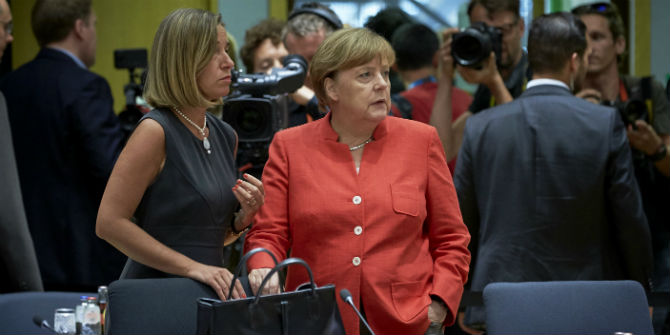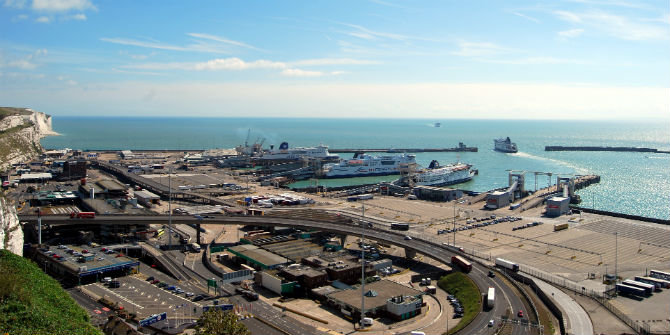 The run-up to the Brexit negotiations has been disastrous for the UK, writes former negotiator Steve Bullock. It has hectored and insulted the EU27’s intelligence and undermined its own credibility. The chances of securing a good deal in the time left are minimal: approaching extremely complex negotiations, Britain chose to be ‘bloody difficult’.
The run-up to the Brexit negotiations has been disastrous for the UK, writes former negotiator Steve Bullock. It has hectored and insulted the EU27’s intelligence and undermined its own credibility. The chances of securing a good deal in the time left are minimal: approaching extremely complex negotiations, Britain chose to be ‘bloody difficult’.
Being “tough” and being “difficult” are not the same thing. Being tough can work, but only if deployed sparingly at strategic points in negotiations. Being difficult for difficult’s sake never works. It simply breaks trust and creates resentment leading to a justifiable unwillingness in partners to compromise.
Successful negotiation in the EU is not, contrary to popular belief, about thumping the table and demanding you get everything you want for nothing in return. It’s also not about undermining your opposite numbers (oppos in Brussels-speak), or insulting their intelligence by making outlandish claims. Yet, in preparing for Brexit negotiations, the UK government has done all of these things with, it seems, gusto and pride.
Trust is key to a successful negotiation. Both sides must know that the other is negotiating in good faith. Both may know that walking away is an option in extremis, but openly threatening this undermines trust that a solution is being sought. Any compromises or concessions require trust and good faith.
The EU27 have been dismayed at Britain’s position. Vice-President of the European Council Federica Mogherini and German Chancellor Angela Merkel at a Council meeting in June 2017. Photo: European Council via a CC-BY-NC-ND 2.0 licence
Understanding your oppos is essential. Each has a complex set of constraints and expectations from their own side. Understanding their position allows you to identify solutions that satisfy their concerns and meet your objectives. If you have put yourself in the position that your overall line is fundamentally incompatible with that of your oppos, you have already lost.
An oppos’ issue with one of your lines may be less fundamental than it looks. You should be guiding your oppos towards being able to support, or at least not block, something as close to your preferred outcome as possible. The process is a long, complex one, and actions at any point will not be forgotten later.
Positions should be clearly prioritised, with built-in fallback positions. Everyone wants their priority to be your number one, must be got, can’t be traded priority, but they simply can’t all be. Many will have to be traded, and you should know which can be and for what.
Flexibility must be built into your position from the start. Not everything can be a red line. Oppos respect genuine red lines – they have them too. Claiming that every point is a red line though is crying wolf.
The pre-negotiation phase has been a disaster for the UK. The UK government first tried to divide the EU27, and then, when that didn’t work, set about deliberately breeding resentment and mistrust. The balance of power is such that the EU27 hold almost all the cards, but the government seems in a state of denial about this. Its Cabinet ministers hectored, smeared and threatened the very people they are asking for help and concessions from.
The EU27’s carefully drafted position papers synthesise a multitude of opening positions from 27 governments, the European Parliament, and the Commission. While these papers do not represent a final offer, they equally do not represent a first go at a vague wish list. The UK government knows this. Yet its approach has been to pretend that the EU27’s positions were mere posturing, particularly over the sequencing of negotiations (which the UK caved in on in the first hours of negotiations), citizens’ rights and the Four Freedoms. This was absurd and served to make UK look like it was not a serious negotiator.
Then came the ill-fated “No Deal Better than Bad Deal” rhetoric. This had a disastrous effect on the UK’s credibility, largely because it is demonstrably untrue. Of course the EU27 does not want the UK to walk away with no deal. It would cost them dearly, but they will deal with it if they must. The EU itself and its core principles are more important. Besides, everyone knows that no deal would cost the UK an order of magnitude more than the EU27, so this strategy served only to reduce trust.
The UK government has acted as if the EU27 countries are yet to discover the internet, and don’t have access to UK news. The EU27, though, knows the UK has backed itself into a corner on so many issues that its positions are fundamentally incompatible with the positive outcomes it has said it will get. The EU27 knows that this government will now find it politically impossible to go back with a big exit bill, or accept freedom of movement, or European Court of Justice jurisdiction over anything, no matter what it gets in return.
Ruling out these things publicly, instead of explaining and managing expectations at home, shows the UK government is either willing to lie to its people or genuinely ignorant of the realities. This weakens any sympathetic voices for the UK.
Finally, it really helps to have the arguments, facts and moral high ground on your side in negotiations. The UK has showed again and again that it has none of these. The unwillingness to guarantee citizens’ rights was bad, but the threat to bargain over security cooperation was a moment of appalling moral weakness.
The EU27’s leaders very much want a deal, but the government’s approach has made any desire to look for solutions that suit the UK evaporate. Why bother when they don’t appear to want a deal anyway? Why give concessions when the UK’s constraints are entirely of its own making?
In my view, the chances of this government getting any deal, let alone a good one, in only 21 months, are minimal. But I think it knows this. The Chancellor Philip Hammond, a lone moderate, pleaded for a transitional deal lasting up to four years. The level of complexity is too much for the UK’s Brexit negotiators, their preparations too poor, and the messaging too self-defeating.
I can therefore only conclude that this government’s plan is to walk out of negotiations, which will, of course, be a catastrophe for the UK. And all for want of a little humility, trust, honesty, organisation and understanding. But the government just couldn’t help itself, could it? The negotiators had to be bloody difficult.
Please read our comments policy before commenting.
Note: This article gives the views of the author, and not the position of EUROPP – European Politics and Policy, nor of the London School of Economics. It is based on a Twitter thread originally posted here and was originally published at LSE Brexit.
_________________________________
 Steve Bullock
Steve Bullock
Steve Bullock worked at the UK Representation to the EU from 2010-2014 where he negotiated several EU regulations for the UK in EU Council working groups. He has also worked for the European Commission and the Department for International Development’s Europe Department.





Another Munich type moment ahead?Appeasing the far right seems to be the May governments policy demonstrating an apparent total disregard for the national interest. Politicians ways of negotiating are certainly not what we teach in law schools and certainly nothing like what I was taught at LSE. The current policy is inept and frankly embarrassing.
Diplomacy not political opportunism for the populist press or masses is required. When foreign policy is dictated by domestic party political concerns history warns us of the risks. Here the stakes are too high for any more mistakes.
This is a matter for professional diplomats not amateurs.
I agree. The way HMG set about dealing with the result of the June 2016 referendum was inept. The result wasn’t even overwhelming, 52%/48% in favour of leaving the EU, so Mrs May never had a particularly strong mandate to go charging off in any one direction. Her cabinet is also totally split following the disastrous results at the general election.
I believe a far better negotiation stance would have been, to be far more humble. The politicians in the EU are also elected and know with their own electorate how stupid and fickle they can be. The message the voter may send to the initiator of the referendum may not be the answer to the question they have asked on the ballot paper.
I’m not convinced that they don’t understand that the internet exists. It seems that the people in charge of this mess genuinely don’t care what Europe thinks. It must be because there is a plan to walk out with no deal. Boris Johnson’s claim, today, that we have no intention of paying any settlement and we’d still get an exceptional deal just defies all sense of trying to get an amicable resolution.
At the very least this informs the rest of the world what our negotiating strengths are likely to be in trying to carve out other deals.
There are several different problems at play here. One the EU is more interested in punishment then negotiation as is proven by their demands. Ranging from permanent extraterritoriality come on does anyone honestly believe that any country would accept this. I thought colonialism was finally out of fashion. Some separation payment I can see but 60 billion these negotiating positions are nearly as unreal as the UK’s position on how they will get a free trade agreement. Neither side is acting in good faith in these discussions at all. I would have to guess the EU either wants to force the UK to give up on exit, (which they can’t and convince their own voters their is any point to voting) or to damage and fragment the UK so badly no other country will ever consider stepping out of line. Bluntly the UK’s people are at best inept I would agree but the EU is NOT acting in good faith. They are making demands that CANNOT be accepted by the UK and they know it.
WITH THE UTTERLY INCOMPETENT TORIES IN CHARGE WITH THEIR MY WAY THE HIGHWAY STANCE WE ARE NEVER GOING TO GET A DEAL. THEY DON’T DO NEGOTIATION HOPE PEOPLE REMEMBER THE TORIES BROUGHT THE UNNECESSARY REFERENDUM FOR CAMERON’S OWN POLITICAL EXPEDIENCE. it is their divisions which led to lie after lie to and for brexit leaving the the biggest in the dark with only their gut feeling to go with political crisis since 1945 1oo% manufactured in tory HQ